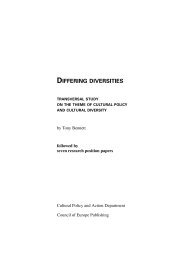Why we need European cultural policies: the impact of EU ...
Why we need European cultural policies: the impact of EU ...
Why we need European cultural policies: the impact of EU ...
Create successful ePaper yourself
Turn your PDF publications into a flip-book with our unique Google optimized e-Paper software.
Gradual development and introduction <strong>of</strong> new measures <strong>of</strong> media policy <strong>we</strong>re also partly inspiredby <strong>the</strong> jurisprudence and rulings <strong>of</strong> <strong>the</strong> <strong>European</strong> courts. Similarly, changes happening as aconsequence <strong>of</strong> enforcing regulations in o<strong>the</strong>r policy fields, such as for example competitionrules, are also evolving and it is only after enforcement and implementation <strong>of</strong> <strong>the</strong> acquiscommunautaire that it will be possible to monitor and assess properly <strong>the</strong> possible <strong>impact</strong> onculture and <strong>cultural</strong> <strong>policies</strong>.The questionnaire resultsThe first part <strong>of</strong> <strong>the</strong> questionnaire aimed to ga<strong>the</strong>r information about respondents’ overallassessment <strong>of</strong> <strong>the</strong> <strong>impact</strong> <strong>of</strong> <strong>the</strong> enlargement.The first question asked, `How do you assess <strong>the</strong> <strong>impact</strong> <strong>of</strong> <strong>the</strong> <strong>EU</strong> enlargement on <strong>cultural</strong><strong>policies</strong>?’ (An accompanying letter explained <strong>the</strong> context <strong>of</strong> <strong>the</strong> questionnaire.)This required individual assessment, as it was clear that <strong>the</strong>re was no data or surveys to inform<strong>the</strong>ir responses. The responses <strong>we</strong>re quite varied. Most <strong>of</strong> <strong>the</strong> respondents thought that <strong>the</strong><strong>impact</strong> <strong>of</strong> <strong>the</strong> <strong>EU</strong> enlargement on <strong>cultural</strong> <strong>policies</strong> was ra<strong>the</strong>r important; some believed that it wasvery important; two respondents believed that it was not important.This range <strong>of</strong> responses underlines <strong>the</strong> complexity <strong>of</strong> <strong>the</strong> state <strong>of</strong> <strong>European</strong> <strong>cultural</strong> policy,described in earlier chapters. Respondents’ views depended on whe<strong>the</strong>r <strong>the</strong>y believe <strong>the</strong>re wasa <strong>cultural</strong> component to <strong>the</strong> enlargement. It is evident that in <strong>the</strong> first period after <strong>the</strong> accession,changes in <strong>cultural</strong> policy <strong>we</strong>re not so important, or at least <strong>we</strong>re not yet visible.The second question asked respondents whe<strong>the</strong>r, `… <strong>the</strong> <strong>cultural</strong> <strong>policies</strong> <strong>of</strong> your country beenreformed as a consequence <strong>of</strong> <strong>the</strong> accession to <strong>the</strong> <strong>EU</strong> to a greater or lesser extent than o<strong>the</strong>rpublic <strong>policies</strong>?’As anticipated, respondents said almost unanimously that <strong>cultural</strong> <strong>policies</strong> had been reformed toa lesser extent <strong>the</strong>n o<strong>the</strong>r public <strong>policies</strong>. One respondent commented that <strong>the</strong> concept, `o<strong>the</strong>rpublic <strong>policies</strong>’ was too broad and prevented <strong>the</strong>m from ans<strong>we</strong>ring.The next two questions asked if, `<strong>cultural</strong> workers and artists’ [in <strong>the</strong> respondent’s country hadbeen] `mostly in favour, indifferent to or against <strong>the</strong> accession?’; and whe<strong>the</strong>r <strong>the</strong>re had, `beendebates and discussions among artists and <strong>cultural</strong> workers about <strong>the</strong> <strong>impact</strong> <strong>of</strong> <strong>the</strong> accessionon culture?’. If <strong>the</strong>re had indeed been debates, <strong>the</strong> questionnaire asked, `around which topics did<strong>the</strong>y focus?’.The ans<strong>we</strong>rs sho<strong>we</strong>d some interesting discrepancies. Most respondents thought that, in general,<strong>cultural</strong> workers and artists in <strong>the</strong>ir respective countries had been in favour <strong>of</strong> <strong>the</strong> accession. At<strong>the</strong> same time, most believed that <strong>cultural</strong> workers and artists had not been adequately informedabout <strong>the</strong> <strong>impact</strong> <strong>of</strong> <strong>the</strong> accession on <strong>cultural</strong> <strong>policies</strong>.46Part 2 The <strong>impact</strong> <strong>of</strong> <strong>EU</strong> enlargement: results <strong>of</strong> <strong>the</strong> survey <strong>of</strong> researchers and policy-makers














